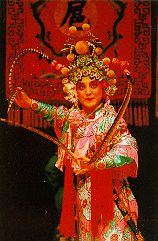This beautiful postcard was sent by ShengSheng from China as a private swap! It is from "Peking Opera" and the dynasty on the card is "The Three Kingdoms".
Its repertoire includes historical plays, comedies, tragedies and farces. many historical events are adapted into Peking Opera plays, which in the past were an important primer on history and ethical principles for poorly educated folk. Two orchestras, playing string and percussion instruments, accompany the singing, which follows a fixed pattern but has a variety of melodies and rhythms. The "jinghu", a small two-strings bowed instrument, is the backbone of the orchestras.
 The operatic dialogues and monologues are recited in Beijing dialect, and some of the words are pronounced in a special fashion, unique to the opera. The actors and actresses, in addition to singing, use well-established movements, such as smoothing a beard, adjusting a hat, jerking a sleeve or raising a foot, to express certain emotions and meaning.
The operatic dialogues and monologues are recited in Beijing dialect, and some of the words are pronounced in a special fashion, unique to the opera. The actors and actresses, in addition to singing, use well-established movements, such as smoothing a beard, adjusting a hat, jerking a sleeve or raising a foot, to express certain emotions and meaning.
The hands and body trembling all over indicates extreme anger and the flicking of a sleeve expresses disgust. If an actor throws his hand above his head and flicks his sleeves back, he is astonished or surprised. An actor or actress demonstrates embarrassment by covering his or her face with one sleeve. Some of the movements are less easily understood. An actor grasps his sleeves with a quick movement and then promptly puts his hands behind his back in a decisive manner to show that he is bracing himself for some peril to come.
Sometimes a movement can go on for as long as 20 minutes. For example, while an actor is conceiving a plan, his fingers and hands flutter nervously at his sides, and when the plan is formulated, he just thumps his fist against the palm of his hand with a resounding smack. When worried the actor will rub his hands together for several minutes.
Peking Opera's acrobatic fighting, whether between two parties or in a melee, is a skillful combination of martial arts and acting. There are four roles in general: the male, the female, the "painted face" and the clown, which are further classified by age and profession. Sheng or male roles can be divided into three categories: the old, the young and the martial arts expert. Dan or female roles include the young and the middle-aged, the innocent and dissolute, girls with martial arts skills and old women. Jing or painted face roles are always played by frank and open-minded men with brightly colored faces. Chou or clown roles are marked by a dab of white on the ridge of the nose. This character is sometimes positive, kind-hearted and humorous, but sometimes negative, crafty, malicious or silly. Each role has its fixed singing and acting styles.
Like the acting and singing, the makeup is stylized, inspired by the masks worn by dancers in Tang, Song and Yuan dynasties operas. The makeup highlights and exaggerates the principal features of the characters.
For the painted face role, the color of their made-up faces can be an indication of their characters or personality. Red indicates uprightness and loyalty; white is craftiness and cunning. Blue indicates a vigorous, courageous and enterprising nature while yellow shows an intelligent character, but a less extroverted one. Black shows a sound and honest character while brown is often the symbol of a stubborn and obstinate character.
The costumes are based on those of the Ming Dynasty, no matter when the story is set. The props can include a cloth wall, tents, parasols, whips, paddles and weapons. The props are realistic, but not so elaborate that they detract from the performance. Exaggeration and symbolism are characteristics of the opera. Holding a whip is enough to indicate an actor is galloping on a horse. A few soldiers on the stage may represent a whole army. An actor circling the stage suggests a long journey.
Often there are just a table and a few chairs on the stage. The description of many situations depends on the performance of the actors and actresses. In this respect, it is quite different from modern plays of the English languages for the lack of stage manager to tell the setting, the time and overview.
Opening a door, walking at night, rowing a boat, eating, drinking and the like are all demonstrated by the stylized movements of the actors and actresses. Performers also use their eyes and facial expressions to help convey the specific meaning.
In the past 200 years, numerous schools and celebrated performers have emerged. Many of them are emulated by modern-day actors and actresses. Famous male actors include Tan Xinpei, Yang Xiaolou, Yu Shuyan, Ma Lianliang and Zhou Xinfang. The most famous actors who played female roles are Mei Lanfang, Shang Xiaoyun, Cheng Yanqiu, Zhang Junqiu and Xun Huisheng.
Peking Opera represents an important part of Chinese culture and has become a refined form of art as a result of the hard work of hundreds of artists over the past two centuries.[shme.com]



This is a very special card!
ReplyDelete